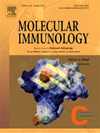Molecular Immunology is primarily devoted to the publication of immunological knowledge which can be delineated at the molecular level. Within this framework are included contributions concerned with the molecular analysis of the cellular components and processes which underlie the physiological behavior of cells involved in immune phenomena. Papers which merely describe new monoclonal antibodies and/or epitope mapping will no longer be accepted unless they have a direct relevance to the understanding of the immune system. The various forms of communications in Molecular Immunology will be as follows: Research Reports. These constitute the major category of communications. Each report consists of a detailed and complete description of the research problem, the experimental approach and the findings. It must provide new and significant knowledge and contain the information essential for verification of conclusions by other laboratories. Manuscripts are subject to detailed scrutiny by expert reviewers whose recommendations are the primary determinants of acceptability for publication. Groups of research reports as 'mini symposia' may also be organized by a Guest Editor, in agreement with the board of Regional Editors. Such reports will also be subject to critical review. It is anticipated that the publication of such invited groups of papers in selected areas may promote new openings in recently emerging fields and encourage individual contributions in these new areas. Short Communications. To provide rapid dissemination of timely and significant observation in molecular immunology, the journal will publish short communications in the form of a photographic reproduction of the original manuscript (2 or 4 pages). These manuscripts will also be evaluated by experts.
